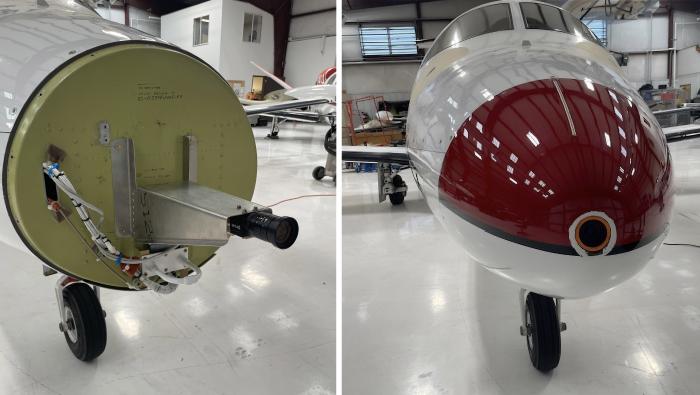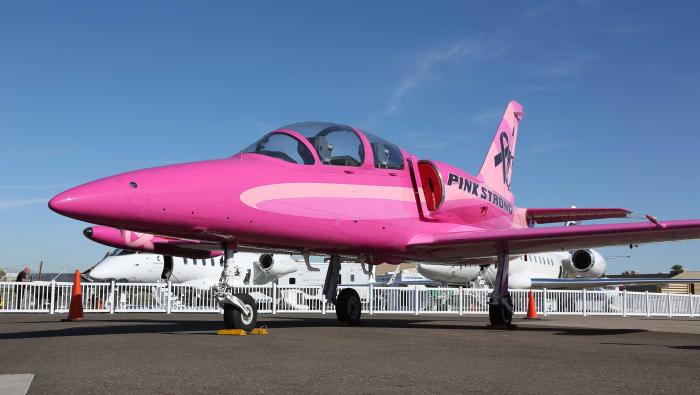
Eclipse Aerospace has begun flying Daedalean AI’s visual awareness system in an Eclipse 550 twinjet, testing the system’s artificial intelligence (AI)-based capabilities for detect-and-avoid traffic deconfliction. Ultimately, Daedalean’s visual awareness system will offer the traffic capability, as well as landing guidance and navigation in GPS-denied environments.
Although this project is in the early stages of testing and not yet on a certification track, Daedalean is pursuing an FAA Part 23 STC for its PilotEye visual traffic detection system in partnership with Avidyne. The company is also developing a similar traffic system, Ailumina Vista, for Part 27 rotorcraft and is working on an EASA STC.
The visual awareness system relies on cameras mounted on the aircraft and it employs machine learning, which Daedalean explained is a form of AI that “leverages increased computer power to do more efficiently what until now could only be done by people.” The technology uses Daedalean’s “situational intelligence, the ability to understand and make sense of the current environment and situation and anticipate and react to potential threats.”
For the Eclipse testing, the 550 jet is equipped with two cameras, one forward-facing and one looking downward. The tests are being conducted in Albuquerque, New Mexico, where Eclipse is headquartered.
|
Safety management systems (SMS) are already required for domestic and international air carriers. And by May 28, 2027, Part 135 on-demand charter and commuter operators, some aircraft manufacturers, and air-tour operators will be required to comply with FAR Part 5 SMS regulations.
SMS implementation for charter operators has strong industry support; however, it’s not a silver bullet. Often overlooked is the importance of a positive safety culture. SMS for charter and air tour operators was on the NTSB’s Most Wanted List for many years and is defined as a formal, top-down, organization-wide approach to managing risk and assuring the effectiveness of risk controls.
“This is a significant step forward for aviation safety. I’m pleased the FAA issued the final rule requiring all Part 135 operators and FAR 91.147 air tour operators to implement a safety management system,” NTSB member Michael Graham said. “Operators are safer when they proactively and systematically identify hazards and mitigate their changing risks through an SMS.”
Safety culture is how safety is perceived, valued, and prioritized in an organization; it reflects a commitment to safety at all levels. SMS and positive safety culture are inseparable and go together like peanut butter and jelly.
|
SEA Prime, which runs the general aviation infrastructure at Milan, Italy’s two major airports—Linate (LIML) and Malpensa-Silvio Berlusconi International (LIMC)—this week reported it has seen approximately 27,000 movements through the first nine months of the year—largely inline with last year’s results. The company, which operates FBOs under the Milano Prime brand, noted that its North American traffic grew by 4%, spurred by major events in the city such as Milan Fashion Week and the F1 Grand Prix.
With the area set to host the Winter Olympic Games in little more than a year, SEA Prime is engaged in expansion of its Linate facility. It will add 107,000 sq ft of ramp at this location to accommodate more aircraft parking. Further, SEA Prime is expanding its terminal by 25,000 sq ft to add more lounge space and passenger service areas to enhance the customer experience.
“As we continue to strengthen our leadership in business aviation across Italy and Europe, we are seizing the opportunity presented by the Milan-Cortina 2026 Olympic Games,” explained SEA Prime CEO Chiara Dorigotti. “The expansion of Linate Prime highlights our commitment to providing a terminal for our customers with high service and sustainability standards.”
|
Availability and cost remain significant roadblocks to widescale adoption of sustainable aviation fuel (SAF), and a panel of industry experts at NBAA-BACE this week discussed ways of overcoming those and other obstacles as the industry strives to reach net-zero emissions by 2050.
According to Avfuel executive v-p C.R. Sincock, business aviation represents approximately 5% to 6% of the total demand for jet fuel but is already responsible for 10% of SAF usage. "I think that business aviation so far is actually doing a great job on a relative basis," he noted.
While the industry is adopting increasingly more SAF, it is still working off a very low starting point. Sincock highlighted Avfuel’s forthcoming expansion of SAF availability along the East Coast following its partnership with Valero Marketing and Supply.
Josh Mesinger, v-p of Mesinger Jet Sales, addressed the financial challenges, acknowledging that SAF carries a premium compared to jet-A. Meanwhile, 4Air president Kennedy Ricci reinforced the importance of sustainability as a value proposition, especially as generational shifts occur within corporate structures. He pointed out that environmental responsibility is becoming increasingly relevant to both talent recruitment and customer relations.
“Seventy-one percent of millennials say climate change is a top priority to them,” Ricci said, adding that transparency around corporate emissions has grown substantially. "Four years ago...40% of Fortune 500 companies reported their emissions publicly. Now we're at 99%."
|
Textron’s Bell division saw third-quarter revenues climb to $929 million, up $175 million from the same period a year ago, thanks mostly to higher volume and mix. Segment profit in the quarter also rose by $21 million, to $98 million, due to favorable impact from performance and pricing.
The company delivered 44 civil helicopters (41 light singles and twins and three medium-twin Bell 412s) in the three-month period, nearly double the 23 (21 light singles and twins and two 412s) handed over to customers in last year's third quarter. This accounted for $61 million of the revenue increase in the quarter and included 24 Bell 505s, thirteen 407s, and four 429s.
On the military side, Bell shipped just one aircraft—a V-22—but accounted for $81 million of the revenue increase thanks to funding from the Future Long-Range Assault Aircraft (FLRAA) program for the U.S. Army.
Bell's backlog at the end of the quarter was $6.5 billion, up $2.3 billion from the second quarter. This increase largely reflects the approval of “Milestone B” for FLRAA and the resulting transition into the engineering and manufacturing development phase of the program. The company is developing the V-280 Valor tiltrotor under the FLRAA program.
|
The industry-wide Climbing Fast campaign welcomed the Canadian Business Aviation Association (CBAA) as its newest member this week at NBAA-BACE 2024. Climbing Fast aims to advance the industry’s commitment to achieving net-zero carbon emissions by 2050. CBAA becomes the second international partner to join the alliance, following the European Business Aviation Association’s membership earlier this year.
“CBAA is thrilled to be part of the Climbing Fast mission in Canada, which helps propel the industry forward through groundbreaking innovation in sustainability,” said CBAA CEO Anthony Norejko. NBAA president Ed Bolen added that the collaboration is vital for highlighting the industry's global sustainability leadership.
In addition to the partnership announcement, Climbing Fast unveiled its inaugural annual report, showcasing its achievements over the past year in engaging policymakers. The campaign continues to foster international collaboration on regulatory issues and sustainability innovations across the business aviation sector.
|
Signature Aviation announced a new fee structure aimed at enhancing transparency and reducing costs for piston aircraft operators, following advocacy from the Aircraft Owners and Pilots Association (AOPA). Effective immediately, single piston operators will face a maximum handling fee of $30, which can be waived with the purchase of 10 gallons of 100LL fuel. Twin piston operators will incur a $60 handling fee, waived with a 30-gallon purchase.
These changes represent up to a 50% reduction from previous rates, according to the company. The updates will be implemented across Signature’s U.S. network, with the exception of 16 FBOs located at major international airports. In addition, Signature plans to expand its 100LL self-service fueling options, offering fuel at an average of $1 less per gallon than full service.
“I am pleased Signature has heard us and is taking steps to embrace the general aviation community,” said AOPA president and CEO Mark Baker.
Signature will continue to charge a non-waivable average $8 infrastructure fee and pilots will continue to be responsible for any fees charged by the airports such as landing fees.
|

Photo of the Week
Think pink. The “Pink Jet,” an L-39 Albatros military trainer jet flown by Aerial Angels, certainly stood out this week at the NBAA-BACE aircraft display at Henderson Executive Airport (KHND). It was there to be a “powerful symbol of strength, hope, compassion, resilience, and community for breast cancer survivors and those who’ve lost loved ones to the disease.” Photo by AIN contributing photographer Mariano Rosales.
Keep them coming. If you’d like to submit an entry for Photo of the Week, email a high-resolution horizontal image (at least 2000 x 1200 pixels), along with your name, contact information, social media names, and info about it (including brief description, location, etc.) to photos@ainonline.com. Tail numbers can be removed upon request. Those submitting photos give AIN implied consent to publish them in its publications and social media channels.
|
AINalerts News Tips/Feedback:
News tips may be sent anonymously, but feedback must
include name and contact info (we will withhold name on request). We reserve the
right to edit correspondence for length, clarity, and grammar. Send feedback or
news tips to AINalerts editor Chad Trautvetter.
|
AINalerts is a publication of AIN Media Group, 214 Franklin Avenue, Midland Park, New Jersey. Copyright 2024. All rights reserved.
Reproduction in whole or in part without permission is strictly prohibited.
|
|















